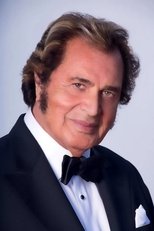Engelbert Humperdinck
Arnold George Dorsey MBE (born 2 May 1936), known professionally as Engelbert Humperdinck, is a British pop singer who has been described as "one of the finest middle-of-the-road balladeers around". He achieved international prominence in 1967 with his recording of "Release Me".
Starting as a performer in the late 1950s under the name "Gerry Dorsey", he later adopted the name of German composer Engelbert Humperdinck as a stage name and found success after he partnered with manager Gordon Mills in 1965. His recordings of the ballads "Release Me" and "The Last Waltz" both topped the UK Singles Chart in 1967, selling more than a million copies each. Humperdinck scored further major hits in rapid succession, including "There Goes My Everything" (1967), "Am I That Easy to Forget" (1968) and "A Man Without Love" (1968). In the process, he attained a large following, with some of his most devoted fans calling themselves "Humperdinckers". Two of his singles were among the best-selling of the 1960s in the UK.
During the 1970s, Humperdinck had significant North American chart successes with "After the Lovin'" (1976) and "This Moment in Time" (1979). Having garnered a reputation as a prolific concert performer, he received renewed attention during the 1990s lounge revival with his recordings of "Lesbian Seagull" for the soundtrack of Beavis and Butt-Head Do America (1996), and a dance album (1998). The new millennium brought a range of musical projects for the singer, including the Grammy-nominated gospel album Always Hear the Harmony: The Gospel Sessions (2003) and a double album of duets, Engelbert Calling (2014). In 2012, Humperdinck represented the UK at the Eurovision Song Contest in Baku with the song "Love Will Set You Free", and placed 25th out of 26. After marking more than 50 years as a successful singer, Humperdinck continues to record and tour, having sold more than 140 million records worldwide.
Arnold George Dorsey was born in Madras, British India (now Chennai, India) in 1936, one of 10 children born to British Army NCO Mervyn Dorsey, who was of Welsh descent, and his wife Olive who, according to the singer, was of German descent. Various sources also say that he has Anglo-Indian heritage. His family moved to Leicester, England, when he was ten years old. He later showed an interest in music and began learning the saxophone. By the early 1950s, he was playing saxophone in nightclubs, but he is believed not to have begun singing until he was in his late teens. His impression of Jerry Lewis prompted friends to begin calling him "Gerry Dorsey", a name that he worked under for almost a decade. ...
Source: Article "Engelbert Humperdinck (singer)" from Wikipedia in English, licensed under CC-BY-SA 3.0.
Acted in
Die Helene Fischer Show 2019
2019
as Self
Grace and Frankie
2015
as Engelbert
Pop Charts Britannia: 60 Years of the Top 10
2012
as Self
The Joy of Easy Listening
2011
as Self
The Story of Light Entertainment
2006
as Self
I Love the '70s: Volume 2
2006
as Self
Engelbert Live
2003
as Self
The Terry and Gaby Show
2003
as Self - Guest
Engelbert Humperdinck: Live at the London Palladium
2000
as Self
Where Are They Now?
1999
as Self
The Vanessa Show
1999
V.I.P.
1998
as Self
E! True Hollywood Story
1996
The State's 43rd Annual All-Star Halloween Special
1995
as Self
Musik für Sie
1995
as self
Chicago Hope
1994
as Self
Sherlock Holmes and the Leading Lady
1991
as Eberhardt Bohm
Even Angels Fall
1991
as Kevin Douglas
Separate Bedrooms
1989
as Engelbert
Glory Years
1987
as Self
Engelbert Humperdinck: Live at the Royal Albert Hall
1985
as Self
Surprise, Surprise
1984
as Self - Performer
Oops, Those Hollywood Bloopers!
1982
as Self (archive footage)
Musikantenstadl
1981
as Self
The Cannon & Ball Show
1979
as Self
Mike Yarwood In Persons
1976
as Self
The Captain and Tennille
1976
as Self
The Sonny and Cher Show
1976
as Self - Guest
The Jeffersons
1975
as Engelbert Humperdinck
The Special London Bridge Special
1972
as Royal Guard
This Is Tom Jones
1969
as Self
Rowan & Martin's Laugh-In
1968
as Self
Malibu U
1967
as Self
Europarty
1967
as Self
Best of The Dean Martin Variety Show
1966
The Hollywood Palace
1964
as Self - Host
Top of the Pops
1964
as Self
Miss USA
1963
as Entertainment
The Bruce Forsyth Show
1959
as Self - Guest
The Liberace Show
1952

































